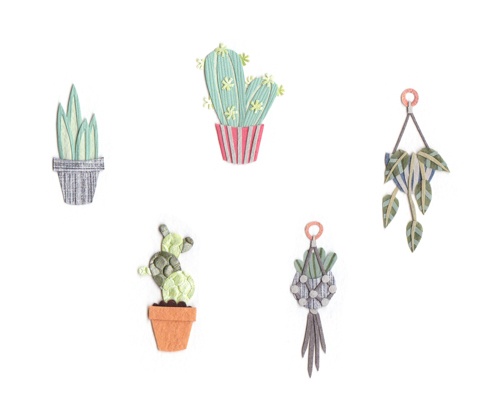 Illustration by Tara Galuska.
Illustration by Tara Galuska.
Leaf Thief
Letter from Montreal.
Early last year, while attending a memorial for my grandmother in Gridley, California, I stole a plant from my cousin’s garden. The cousin was hosting us in her sprawling farmhouse bungalow, sheltered by rows of walnut trees. In the carefully tended garden that encircled the house, birds sang as they flitted between the branches of a giant magnolia; a potato vine scaling the trellis above the patio was flush with white flowers. The root of the Central Valley’s fecundity—the warm, warm sun—bathed everything in light.
The plant I took was a silver squill, a tiny, onion-like bulb with a spray of pewter-coloured leaves emerging from its top. A silver squill will yield new bulbs as its outer layers of skin peel away, until, over time, a teeming assembly of them gathers; a cluster of the plants had colonized a wok-shaped pot on my cousin’s patio. I ripped out a bulb without asking and squirrelled it away in my jacket pocket, intent on smuggling it back to Canada and making it mine.
I once copped an aloe pup from a municipal garden. I’ve plucked a palmful of sedums from a living wall. The elephant bush sitting on the window ledge in my kitchen came from the courtyard of a model home. These thefts are a compulsion that compounds the sin of keeping plants inside: plants from the deserts and tropics of the world, like the South African squill, don’t want to live indoors, least of all in Montreal. But people like me keep bringing them here for our own benefit, to lift us up when winter’s eternal darkness drags us down. The stolen ones have the virtue of being free.
If you’re conscientious about your plants, the cost comes later, when the moral hazard of plant ownership starts to weigh on you. Like a caged songbird, a houseplant improves your life by surrendering much of its own. Whatever conditions made a plant’s original niche home are now yours to worry about, and the penalty of negligence is death. There are no earthworms mixing the soil, no microbes fixing nitrogen in the leaf litter, no predators grazing on parasites, no rainfall dampening the earth. However hard an indoor gardener tries to fill all these roles at once, it’s impossible to replace the sun as it lolls behind banks of snow-laden clouds. It’s all you can do to crowd your houseplants against a window and watch helplessly as a dull beam sweeps across your apartment like a searchlight, finding each languid plant for only a moment.
For me, the thought of this cost ebbs whenever I exit the Metro at the Kiosque Mont-Royal in the summertime, or linger in a florist’s stall at Jean Talon Market. (Plants! So many plants!) The thought of the anemic winter sun didn’t cross my mind for the two long days the squill sat in my pocket as I wandered through the walnut groves and spent time with my family in Gridley. Pests were a distant notion as I sweated in the customs line, wondering which pockets they might check if they pulled me aside for a special screening.
It was only at home, once I’d nestled the squill in some fresh potting soil, that the worry set in. The thin stalk of buds that adorned the plant when I plucked it bloomed soon after I arrived—tiny fairy bells hung with bright-yellow stamens on purple filaments. As it flowered, though, the bulb shrivelled down to the size and shape of a raisin, and from tip to base, each of its three leaves dried up one by one. Clearly, I thought, the beleaguered pup was directing what remained of its life-force at a desperate effort to sow some seed before it became a casualty of my self-indulgence.
I needed the squill as a salve for my dreary moods. A tonic for my impatience. A cure for the wishful thinking each early thaw inspires, repeatedly nudging the prospect of spring further into the future.
After two suspenseful weeks—when the flowers were wilted and lifeless—the squill saved me as it saved itself. The final leaf was half gone when a new curl of green poked out from the bulb, now swelling with life. Such a relief! Because what kind of person rends a plant from its sunny California garden and brings it to a third-floor walk-up in Little Italy, only to watch over it as it dies? I may steal plants, but I’m not depraved. I simply need them to live.





